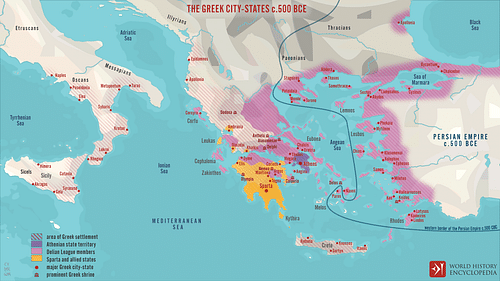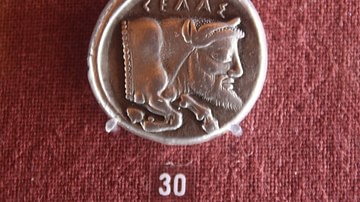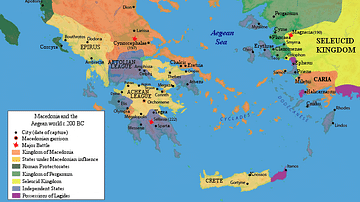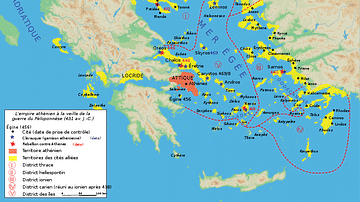
A polis (plural: poleis) was the typical structure of a community in the ancient Greek world. A polis consisted of an urban centre, often fortified and with a sacred centre built on a natural acropolis or harbour, which controlled a surrounding territory (chora) of land. The term polis has, therefore, been translated as 'city-state' as there was typically only one city and because an individual polis was independent from other poleis in terms of political, judicial, legal, religious and social institutions and practices, each polis was in effect a state. Like a state, each polis was also involved in international affairs, both with other poleis and non-Greek states in the areas of trade, political alliances and wars. Other cultures had a similar social and political structure, notably, the Babylonians, Etruscans and Phoenicians, and the latter are believed to be the originators of the polis as a communal unit.
The polis emerged from the Dark Ages which followed the fall of the Mycenaean civilization in Greece and by the 8th century BCE a significant process of urbanisation had begun. There were eventually over 1,000 poleis in the Greek World but among the most important were Athens, Sparta, Corinth, Thebes, Syracuse, Aegina, Rhodes, Argos, Eretria, and Elis. The biggest was Sparta, although with some 8,500 km² of territory, this was exceptionally large and most poleis were small in size. However, poleis such as Athens, Rhodes and Syracuse possessed significant naval fleets which also allowed them to control wide areas of territory across the Aegean.
It is all hilly and shaded, and has many springs...The city is well provided with public buildings, gymnasia, stoas, temples, theatres, pictures, statues, and an agora which is excellently situated for all trading purposes.
3rd century BCE description of the polis of Chalcis (Anonymous).
Common Features
Although individual poleis each had their own particular identity and individual institutions and practices differed widely and even evolved over time, there were several features common to the majority. Most of the population of a polis lived in the city rather than being spread across small farm communities in the surrounding territory and the heart of the urban area was usually a sacred space with one or more temples. From the 8th century BCE these were almost always the most impressive buildings in the polis but sometimes they were separate from the urban area proper, perhaps to take advantage of more impressive natural locations or because those locations had a particular religious significance. From the 7th century BCE the city was usually fortified with a city wall (Sparta being a notable exception) and the agora space was created for civic and commercial activity. From the 5th century BCE many poleis displayed evidence of town planning (especially in newly established colonies) with specific areas of the city designated for private, public and religious functions. Many poleis also had a designated space for public assembly, either for political purposes or also for entertainment, for example, a theatre and a gymnasium.
A fundamental idea common to most poleis was that all male citizens had (at least theoretically) equal political rights based on ownership of property. In practice, whatever the political system adopted - tyranny, oligarchy or democracy - political power was dominated by a few aristocratic families who held for themselves all the important positions in the polis such as membership of elite councils, magistracies and the higher military ranks. Also, within these citizen bodies there were richer and poorer citizens. Overtime, and especially following the introduction of money, the richer class, whose status had once been based on land ownership, began to accumulate wealth from investments and loans they made, in effect increasing the difference between rich and poor.
A Unique Identity
Apart from male citizens the social groups which made up Greek society also included women, children, slaves, freed slaves, labourers and foreigners. These could make up as much as 90% of the total polis population and so had to be included and involved in the polis in one way or another if it was to function as a cohesive community. One way of doing this was to create a social identity which differentiated a polis from all others. This identity was achieved in various ways such as the creation of a communal space where people could mix and socialise (the agora). Another was the practising of polis-specific festivals and celebrations on specific dates in the year, usually of a religious nature, which also reinforced the idea that the polis had a unique (often mythical) founder and patron deity.
Other more practical indicators of the polis as a separate unit were boundary markers, written law-codes, coinage using specific imagery related to the polis' history (e.g. the owl on Athenian coins representing Athena, the city's patron), wars - where soldiers fought a common enemy, often to settle disputed territorial claims, and the production of distinctive goods (e.g. Corinthian pottery). A common community history or 'civic memory' was reinforced and commemorated in public statues of local gods, leaders, benefactors and sporting champions. Finally, the polis founded colonies abroad, especially in Magna Graecia and Ionia and became a 'mother' city and provided both a symbolic transfer of identity (e.g. a fire from the city hearth) and a practical transfer of people and community skills (e.g. potters and metal workers).
Pan-Hellenism
Although poleis were, then, each a unique cultural and political unit, the common features mentioned above and other factors such as language and broader religious beliefs meant that there were some feelings of connection between poleis. Like-minded poleis often made political alliances for mutual protection and examples include the Delian and Peloponnesian Leagues. A wider Hellenic attitude between poleis was manifested in two particular instances - wars against non-Greek enemies (e.g. the Persian Wars of the 5th century BCE) and pan-Hellenic festivals such as the Olympic Games held at Olympia every four years. Many poleis participated in these events and sought to advertise their successes in them by erecting commemorative trophies and monuments at sites such as Olympia and Delphi where all Greeks would see them for centuries after.
In the late 4th century BCE Alexander the Great and his successors spread the idea of the polis throughout the Macedonian empire in Asia, typically with re-settled Greeks acting as the ruling elite and the local population becoming subject farmers. In the Roman period the polis continued as a functioning unit but was subordinate to a wider imperial apparatus of Roman-defined provinces. Poleis, therefore, became less significant in terms of independent political power but continued to be significant as providers of civic pride based on fine public buildings and the cultivation of the arts and sciences.






